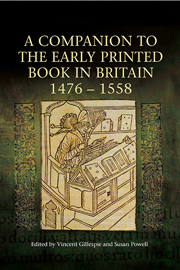Book contents
- Frontmatter
- Contents
- List of Illustrations
- List of Contributors
- Preface
- Acknowledgements
- Abbreviations
- Chronology of the Period
- Introduction
- I THE PRINTED BOOK TRADE
- II THE PRINTED BOOK AS ARTEFACT
- III PATRONS, PURCHASERS AND PRODUCTS
- IV THE CULTURAL CAPITAL OF PRINT
- 12 Humanism and Printing
- 13 Women Translators and the Early Printed Book
- 14 The Printed Book Trade in Response to Luther: English Books Printed Abroad
- 15 Thomas More, Print and the Idea of Censorship
- 16 Catholicism, the Printed Book and the Marian Restoration
- Index of Manuscripts
- Index of Printed Books
- General Index
12 - Humanism and Printing
from IV - THE CULTURAL CAPITAL OF PRINT
Published online by Cambridge University Press: 05 April 2014
- Frontmatter
- Contents
- List of Illustrations
- List of Contributors
- Preface
- Acknowledgements
- Abbreviations
- Chronology of the Period
- Introduction
- I THE PRINTED BOOK TRADE
- II THE PRINTED BOOK AS ARTEFACT
- III PATRONS, PURCHASERS AND PRODUCTS
- IV THE CULTURAL CAPITAL OF PRINT
- 12 Humanism and Printing
- 13 Women Translators and the Early Printed Book
- 14 The Printed Book Trade in Response to Luther: English Books Printed Abroad
- 15 Thomas More, Print and the Idea of Censorship
- 16 Catholicism, the Printed Book and the Marian Restoration
- Index of Manuscripts
- Index of Printed Books
- General Index
Summary
After the death in 1521 of a Cambridge scholar, Bryan Rowe, his associates drew up an inventory of his hundred-odd books. Those books identify Rowe as a follower of the studia humanitatis, the studies least deceivingly translated as the humanities but usually translated now as humanism. Rowe read about classical literature and history, about grammar and rhetoric modelled on classical standards, and about the new ideas of people such as Erasmus who were inspired by a changing understanding of classical texts. Rowe's inventory tells us a lot about the use of humanist printed books in England. First, most of the works on it had not been printed in England by 1521, so Rowe's collection typifies the predominance of imported books for the studia humanitatis in England (the subject of the first section of this chapter). And the relative coherence of Rowe's collection also suggests that receiving imports was not a passive process; the activities of commissioning, collecting and annotating might make the usefulness and character of such books clear – and clearer to us than a mere booklist makes them.
Yet the sketchy evidence of Rowe's inventory makes it uncertain whether all his books were imports: for example, he owned grammars by the humanists Niccolò Perotti and Giovanni Sulpizio, which could have been imports but could equally have been one of eight editions printed in London (STC 19767.3, 23425–23427a, 23427a.7).
- Type
- Chapter
- Information
- A Companion to the Early Printed Book in Britain, 1476-1558 , pp. 227 - 247Publisher: Boydell & BrewerPrint publication year: 2014

